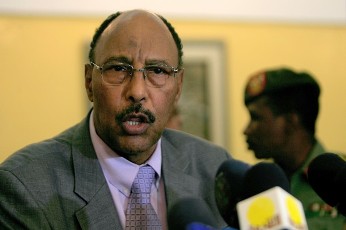Sudan says liberation of Heglig “really close”, negotiations with south suspended
April 11, 2012 (KHARTOUM) – The Sudanese cabinet held an emergency meeting on Wednesday chaired by president Omer Hassan al-Bashir in which they decided to suspend all negotiations with the south on post-independence issues and declared their intention to mobilise all the country’s resources to repel the “aggression”.

South Sudan says it was repelling an attack by Sudan Armed Forces (SAF) inside Unity State after which it pursued Sudanese troops all the way up to Heglig in South Kordofan.
Khartoum later acknowledged losing the town adding that SAF withdrew outside of Heglig leaving the oil facilities there under South Sudan’s control.
The Sudanese council of ministers spokesperson Omer Mohamed Saleh said in remarks to reporters that the cabinet asserted that the attack aimed at sabotaging the economic infrastructure in the country. Nonetheless, he said that the national economy is stronger than what the aggressors think and that Sudan has enough stockpiles of basic goods.
The oil minister Awad al-Jaz in that meeting noted that Sudan has other oil fields besides Heglig that can be used for petroleum and fuel supplies.
A subsequent meeting of the leadership council at the ruling National Congress Party (NCP) also headed by Bashir resolved to call for a comprehensive mobilisation campaign in all of Sudan in which citizens will be urged to head to training camps and frontlines.
Bashir’s assistant Nafie Ali Nafie promised that Sudanese will soon hear good news on reclaiming Heglig.
The NCP leading figure added that the meeting instructed all party bureaus to draw detailed plans to expose “fifth column” by name using what they write and say in their private meetings.
Nafie said this include political parties and NGO’s which he described as agents of domestic and international circles.
Meanwhile the Sudanese defense minister Abdel-Rahim Mohamed Hussein addressed the national assembly today to brief them on the situation on the battle fronts across the country.
Despite calls for a private setting, the session was made public and journalists were able to attend. But Sudanese authorities later gave instructions to newspapers to omit large parts of what was said today.
Hussein started by saying that South Sudan assembled rebels from Darfur and Sudan People Liberation Movement North (SPLM-N) in Blue Nile and South Kordofan. The goal, he said is to target Sudan and for that the Sudan Revolutionary Front (SRF) met in Unity State capital of Bentiu and Pariang County last March.
The rebels met to decide on military plans to occupy Heglig and South Kordofan’s capital of Kadugli. He revealed that Sudan’s army repelled an attack by SRF on Heglig adding that the strategic town of Teludi came under heavy artillery fire which destroyed several buildings and led to displacement by civilians.
Hussein claimed that the rebel force in South Kordofan is comprised of 22 battalions which has 500 fighter each around areas of Kadugli, Teludi and Deling. There are also 64 Land Cruisers belonging to the Darfur Justice and Equality Movement (JEM) in Manga, Pariang, Al-Laloba, Teshwin and El-Tour inside South Sudan, he added.
The top military official said that Sudan Liberation Movement of Minni Minnawi (SLM-MM) has 61 vehicles in Northern Bahr el-Ghazal State.
He acknowledged that following the attack by SPLA and JEM rebels on Heglig, the army withdrew to Khersana in north Heglig.
Hussein assured MP’s that the army is capable of defeating the aggression and reclaiming back the lost territory.
But many in parliament were not convinced and amid chants of “God is Great” many MP’s called for closing the parliament and send some members to the frontlines.
Afaf Taur, an MP from South Kordofan, accused the government of lying and claimed that rebels control 65% of South Kordofan. She warned against recruiting then sending young inexperienced men to the battlefields for them to face death.
Afterwards, the Sudanese parliament adopted a resolution calling for ending negotiations with South Sudan.
(ST)
